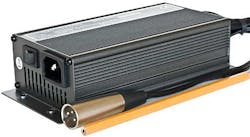Army eyes lightweight universal battery charger for platoon-level use in remote locations
ABERDEEN PROVING GROUND, Md., 1 April 2013. U.S. Army researchers are reaching out to industry to find companies able to provide a man-portable universal battery charger for lithium ion, lithium polymer, and select nickel metal hydride and nickel cadmium batteries.
The Army contracting command at Aberdeen Proving Ground, Md., issued a source-sought notice last week (W91CRB-13-RFI-UBC) for the Universal Battery Charger program to find sources of a universal battery charger for platoon-level for use in remote locations where there is no commercial power grid or reliable power generation infrastructure.
The Army needs such battery charging capability with the use of alternative and/or renewable energy sources along with the standard capabilities of running from any AC power source, off vehicle power, or in military vehicles while the vehicles are moving.
The Army Contracting Command is releasing the RFI on behalf of the Army Program Manager Soldier Warrior (PM SWAR) and the Communications-Electronics Research Development and Engineering Center's (CERDEC) Command Power and Integration (CPI) Directorate.
The battery charger should weigh no more than six pounds; be no larger than 300 cubic inches; meet MIL-STD-810G for shock, vibration, drop, dust, humidity, and rain; meet MIL-STD-461 for electromagnetic interface requirements; have an input DC voltage range of 10 to 33.6 volts DC; have an input AC voltage range of 90 to 265 volts AC at 47 to 63 Hz; have a solar input of variable 120 Watts with maximum power point tracking; be able to use SM bus level iii software that can upgraded when required by the user; be able to operate under different power inputs from 20 to 300 Watts; be able to cascade several chargers and operate in military vehicles; contain USB and standard NATO 13 pin connectors and a standard serial port; and use open sourced software and accessories.
Performance specifications and data requirements for the universal battery charger are online in .pdf form at https://acquisition.army.mil/asfi/attachment_viewer.cfm?Sol_Number=W91CRB13RFIUBC&Seq_Nbr=373425&FILE_NAME=UBC_Performance_Spec.pdf&FILE_EXTENSION=pdf.
The Army wants to hear from companies that now have the technology, qualifications, experience, and capabilities to build such a universal battery charger.
Those responding should send eight-page reports describing their experience in having conducted a first article and delivered product against a military contract.
For questions or concerns contact Contract Specialist Mary Diangelo by email at [email protected] or by phone at 410-306-1548, or email Contract Officer Thomas Marousek at [email protected].
More information is online at https://www.fbo.gov/notices/4a2e6676f4157df5f16b8523abec1561.

